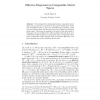Free Online Productivity Tools
i2Speak
i2Symbol
i2OCR
iTex2Img
iWeb2Print
iWeb2Shot
i2Type
iPdf2Split
iPdf2Merge
i2Bopomofo
i2Arabic
i2Style
i2Image
i2PDF
iLatex2Rtf
Sci2ools
108
click to vote
CCA
2009
Springer
2009
Springer
Effective Dispersion in Computable Metric Spaces
We investigate the relationship between computable metric spaces (X, d, ) and (X, d, ), where (X, d) is a given metric space. In the case of Euclidean space, and are equivalent up to isometry, which does not hold in general. We introduce the notion of effectively dispersed metric space. This notion is essential in the proof of the main result of this paper: (X, d, ) is effectively totally bounded if and only if (X, d, ) is effectively totally bounded, i.e. the property that a computable metric space is effectively totally bounded (and in particular effectively compact) depends only on the underlying metric space.
CCA 2009 | Computable Metric Space | Euclidean Space | Metric Space | Theoretical Computer Science |
Related Content
| Added | 12 Aug 2010 |
| Updated | 12 Aug 2010 |
| Type | Conference |
| Year | 2009 |
| Where | CCA |
| Authors | Zvonko Iljazovic |
Comments (0)

